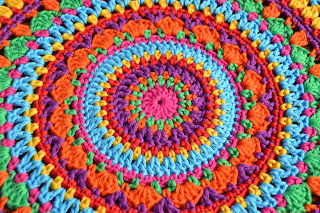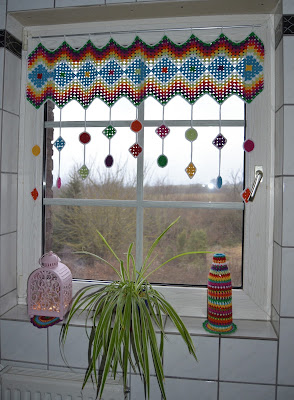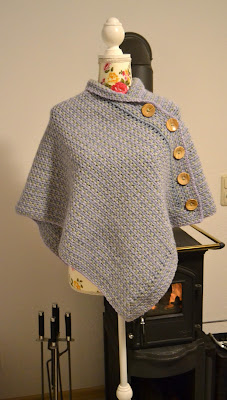Lucienne's Summer Mandala - Part I / Teil 1
Lucienne's Summer Mandala
Part I
Notes:
(1)
After reading the pattern you may marvel why you hardly
ever found join
with slip stitch and chain 3.
I did try to write the pattern this way, but failed, as
I did not use this technique whilst crocheting the mandala myself. As
a matter of fact I prefer to begin a new round (especially when
changing colours) with a chainless start (also known as standing
stitch). The finished crochet piece just looks much better without
these annoying chain stitches. AND: Using a standing stitch also
enables me to make an invisible join... I will definitely not
try to describe these techniques as there are plenty excellent
tutorials and videos to be found online. Do have a look and try for
yourselves. It's pretty easy and looks very nice.
(2)
Once in a while you may finish a round and not be all that happy with
the result, because the mandala simply isn't flat. Don't panic, this
problem will probably be solved as soon as you've crocheted the next
round.
(3)
This pattern may not be suited for absolute beginners as I reduced
the instructions rigorously to the main features.
(4)
The finished mandala measures approx. 13cm in diameter. This will
differ when using another hook and/or yarn.
(5) This
mandala can be crocheted in any yarn you like (using the
corresponding hook). You could also use oddments (as long as you
stick to the same yarn type and/or thickness, otherwise the result
could not be all that presentable.
(6) UK-Terms
(7) Updated 18.10.2016
(6) UK-Terms
(7) Updated 18.10.2016
👉 BUY NOW 👈
Materials:
- crochet hook (here 3,5 mm)
- yarn sewing needle
Yarn:
(1)
I crocheted with Gründl Cotton Fun in following shades:
- yellow
- red
- light blue
- green
- orange
- magenta
- purple
(2)
Yardage:
- Shade A = 4,5m (rd 1 + 8; orange)
- Shade B = 4m (rd 2 + 9; purple)
- Shade C = 9m (rd 3 + 10; red)
- Shade D = 2,2m (rd 4; yellow)
- Shade E = 2,5m (rd 5; magenta)
- Shade F = 2,5m (rd 6; light blue)
- Shade G = 6m (rd 7; green)
Abreviations:
- ch = chain stitch
- htr = half treble
- loop = loop made of ch
- mc = magic circle
- rd = round
- dc = double crochet
- ss = slip stitch
- tr = treble
Instructions:
Start
with a mc
Round
1:
ch 3 (= 1 tr), 15 tr into mc,
ss in 3rd ch (sorry – no standing stitch here)
Round
2: dc in tr, ch 1, repeat 15 times
Round
3: dc in loop, ch 1, repeat 15 times
Round
4:
2 htr in each loop (= 32 htr)
Round
5: dc in htr, ch 1, repeat 31 times
Round
6: dc in loop, ch 1, repeat 31 times
Round
7:
2 tr in each loop (= 64 tr)
Round
8:
1 dc in each tr (= 64 dc)
Round
9: dc in dc, ch 2, skip 1 stitch, dc in dc, ch 2, skip 1 stitch, repeat
15 times
Round
10:
5 tr in loop, dc in next loop, repeat 15 times
Lucienne's Summer Mandala
Teil 1
Notizen:
(1)
Nur einmal habe ich in diesem Muster „Kettenmasche in dritte
Anfangsluftmasche“ verwendet. Das kommt daher, dass ich die
einzelnen Runden mit „stehenden Maschen“ (engl.: standing
stitches) angefangen habe, also ohne die störenden
Anfangsluftmaschen. Obendrein gelingt auch so ein unsichtbares
Rundenende. Das Resultat ist einfach schöner und ebenmäßiger... Da
es im Internet genügend und wirklich hervorragende Beschreibungen
(auch Videos) dieser Technik gibt, werde ich mich nicht an einer
Beschreibung wagen. Schaut einfach mal nach, es lohnt sich!
(2)
Es kann schon mal vorkommen, dass das Mandala am Ende einer Runde
nicht wirklich flach liegen möchte. Keine Panik, das Problem behebt
sich bestimmt am nach der nächsten Runde.
(3)
Da ich diese Anleitung aufs Wesentliche reduziert habe, ist sie
vielleicht nicht wirklich geeignet für absolute Anfänger.
(4)
Das fertige Mandala misst ca. 13cm im Durchmesser. Mit anderem Garn
gehäkelt (und passender Häkelnadel) wird das natürlich abweichen.
(5)
Meiner Meinung nach kann dieses Mandala mit jedem Garn und
entsprechender Häkelnadel gehäkelt werden. Es eignet sich gut, um
Garnreste zu verwerten (daher wird der Garnverbrauch angegeben), aber
dabei dann doch lieber bei derselben Garnsorte und -dicke bleiben,
damit das Resultat auch ansehnlich wird.
Material:
- Häkelnadel (hier Nr. 3,5)
- Stopfnadel
Garn:
Cotton
Fun (Schulgarn) von Gründle in folgenden Farben (inkl. Rundenangabe
und Garnverbrauch):
- Maisgelb (Rd. 4 = ca. 2,2m)
- Signalrot (Rd. 3 + 10 = ca. 9m)
- Himmelblau (Rd. 6 = ca. 2,5m)
- Froschgrün (Rd. 7 = ca. 6m)
- Orange (Rd. 1 + 8 = ca. 4,5m)
- Fuchsia (Rd. 5 = ca. 2,5m)
- Purpur (Rd. 2 + 9 = ca. 4m)
Abkürzungen:
- ALm = Anfangsluftmasche
- fM = feste Masche
- FR = Fadenring
- HStb = Halbe Stäbchen
- Km = Kettenmasche
- Lm = Luftmasche
- LmB = Luftmaschenbogen
- Stb = Stäbchen
- wdh = wiederholen
Anleitung:
Anfangen
mit einem FR
Runde
1:
3 Lm, 15
Stb in FR, Km in 3 ALm (= 16 Stb)
Runde
2: *1 fM
in Stb, 1 Lm*, *bis*15x wdh
Runde
3: *1 fM
in LmB, 1 Lm*, * bis * 15x wdh
Runde
4:
jeweils 2 HStb in jedem LmB (= 32 HStb)
Runde
5:
*jeweils 1 fM in Stb, 1 Lm*, *bis* 31x wdh
Runde
6:
*1 fM in LmB,
1 Lm*, *bis* 31x wdh
Runde
7:
jeweils 2 Stb in jedem LmB (= 64 Stb)
Runde
8:
*jeweils 1 fM in Stb * (= 64 fM)
Runde
9: *1 fM
in fM, 2 Lm, 1 fM überspringen*, *bis* 15x wdh
Runde
10: *5
Stb in LmB, 1 fM in nächsten LmB*, *bis* 15x wdh
P.S.: Teil 2 ist in der Mache... Ich halte euch auf dem Laufenden!












Love the colors, I will for sure try it out.
AntwortenLöschenHello Monica, if you do - please let me know if the pattern is okay? Greetings, Marjan
LöschenGorgeous mandalas! Love these colors :-) Kind regards!
AntwortenLöschenThank you, I simply cannot get enough of them, these colours really make me feel happy.
LöschenBeautiful! A wonderful kaleidoscope of colour!!!
AntwortenLöschenThank you, Zelna. It's fun to work with these colours - they are very inspiring! Have a nice evening, Marjan
LöschenThis mandala looks beautiful, I do love them a lot and we use them daily to put under a mug. Best wishes, Viola
AntwortenLöschenThank you, Viola. I'll definitely use some this way, but I've still got some other ideas... Have a nice evening, Marjan
LöschenThis is so beautiful! I can't wait to try it out. 😃
AntwortenLöschenThank you! Please do let met know if there is anything wrong with the pattern or when things do not work out the way they probably should. Happy crocheting, Marjan
LöschenSo nice pattern and colors!!
AntwortenLöschenGreetings from Marijke
Hallo Marijke, hartelijk welkom! Noch veel plezier, prettig haken en een mooi weekend, Marjan
LöschenLindo blog,parabéns,vou ficar por aqui.Feliz sabado.Valéria.(Brasil).
AntwortenLöschenHello Valeria, bem-vindo! Divirta-se e bom fim de semana, Marjan
LöschenBeautiful crochet mandala with lively colors! Thanks for sharing at CAL # 96: http://www.mazkwok.com/2015/06/crafting-along-96.html
AntwortenLöschenCongratulations for winning my link up!
AntwortenLöschenPlease join this week with the rest of the Mandala ;o)
Just found your website via Hookin on Wednesday via Petals to Picot Blog... I adore the summer and deiced to give it a try however before I begin I must ask... Do your English instructions use UK or US terms? Thanx ~Twigwoman@gmail.com
AntwortenLöschenThe English instructions are in UK terms (e.g. UK treble = US double crochet). Happy crocheting! Marjan
LöschenLovely pattern! I'm in the UK, but a bit confused by the directions - when you say 'single crochet' is that a UK double crochet?
AntwortenLöschenYep - it's a UK double crochet... It's a bit confusing to differerentiate between UK and US terms and get things right too. I do hope this will help. I came across this mistake a little while back, have not got the courage to correct it yet, as so many people already read the pattern. Do you think I should do it anyway? Greetings, Marjan
LöschenOho! Na ja, ich versuche es und hoffe es ist hinterher verständlich. Wohlgemerkt: nachfolgend ist meine Art und diese ist vielleicht nicht die beste! Also: (1) fM: Anfangsschlinge auf die Nadel festhalten (ich lege einfach locker einen Finger drauf, damit sich die Schlinge nicht wendet und der Knoten somit hinter der Nadel bleibt, also zur Rückseite der Arbeit hin zeigt), Nadel in die gewünschte Einstichstelle einführen und fM wie gehabt häkeln = stehende fM; (2) Stb: Anfangsschlinge auf die Nadel, einen Umschlag dazu, beide festhalten (sonst entwickelt sich der Umschlag), Nadel in die gewünschte Einstichstelle einführen und Stb häkeln wie gewohnt (Knoten mithilfe eines Fingers nach hinten halten) = stehendes Stb. So geht das mit allen anderen auch (Km, hStb und DStb), es gelingen sogar zusammen abgemaschte Stiche. Ich hoffe, das ist irgendwie verständlich!? Viele Grüße, Marjan
AntwortenLöschenHola Roberta,
AntwortenLöschenEn realidad ya estoy siguiendo su blog. Me olvidé de poner un enlace a "blogs que amo". He arreglado eso ahora.
Que tengas un gran día,
Marjan
hallihallo gibts auch einen teil 2?
AntwortenLöschenSelbstredend! Und sogar 3 und 4!
LöschenHier schon mal Teil 2: http://marie-lucienne.blogspot.com/2015/06/Mandala-Part-II.html
Einfach mal im Blog-Archiv (an der rechten Seite) unter 2015 Juni und Juli nachschauen!
Viel Spaß,
Marjan
Ich habe Topflappen aus dieser Anleitung gehäkelt. 4x die Reihen 1-15 gearbeitet und dann je 2 mit zwei Runden festen Maschen und einer Schlaufe zusammengehäkelt. Vielen Dank für diese schöne Mandala-Häkelei. Hat Spass gemacht.
AntwortenLöschenWow! Auf die Idee wäre ich nie gekommen, liebe Heidi! Deine Topflappen würde ich liebend gerne mal sehen! Vielen Dank, dass du meine Anleitung dazu verwendet hast. Und noch viel Spaß mit den Topflappen!
LöschenEinen schönen, ruhigen Sonntag,
Marjan